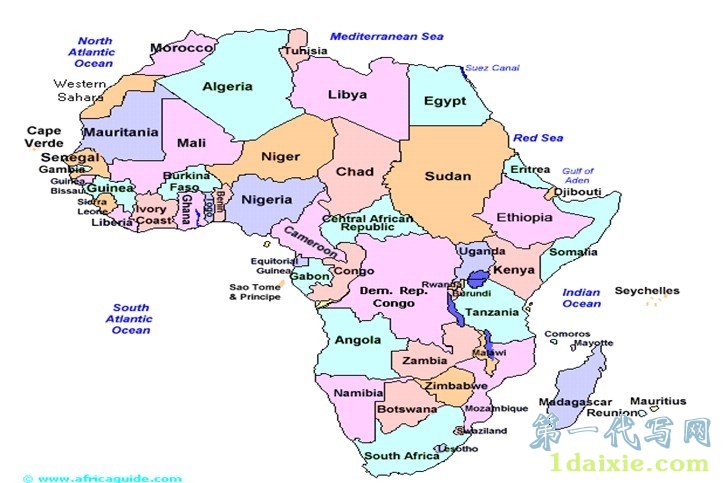留学生市场作业Africa: Prospects and Challenges Tutor: Collins Osei
Introduction
Overview
Ideology
Political Environment
Socio-cultural Factors
Economic Factors
Climatic Factors
Investment Challenges
Investment Opportunities
MNCs and Success Stories
Summary
Map of Africa
Overview
Africa is the second largest continent – over 30 million km², and over 20% of total land area.
Hosts about 15% of the worlds population.
54 countries within the continent
Normally associated and sometimes erroneously with poverty
Still relies heavily on Agriculture industry, natural resources and aid
Continent working towards economic and political integration, economic recovery
Investments from former colonial masters, China, India
Ideological Factors
High dependence on foreign aid – the World Band, IMF, Western countries
Collective ownership of resources as opposed to capitalism
Beliefs and effects of emigration
High dependence on foreign aid – the World Band, IMF, Western countries
Collective ownership of resources as opposed to capitalism
Beliefs and effects of emigration
Political Environment
With the exception of Burundi and Rwanda Countries follow inherited borders from colonial past
State may comprise historic enemies
Same family may be found within two sovereign states
Inevitable ethnic conflicts, e. g, Nigerian ethnic conflicts involving Muslim North, Yoruba of South West and Ijaw and Itsekiri of oil-rich delta region
Improving political stability
Political integration
Recognition of legitimacy of traditional rulers
Political Environment
With the exception of Burundi and Rwanda Countries follow inherited borders from colonial past
State may comprise historic enemies
Same family may be found within two sovereign states
Inevitable ethnic conflicts, e. g, Nigerian ethnic conflicts involving Muslim North, Yoruba of South West and Ijaw and Itsekiri of oil-rich delta region
Improving political stability
Political integration
Recognition of legitimacy of traditional rulers
National Languages adopted from colonial past, English, French, Portuguese, Italian
Native languages
Healthcare
Improved life expectancy
Public and private investment in healthcare
Education
The Role of the elderly in societies
External family system
Migration to cities
Socio-Cultural Environment
National Languages adopted from colonial past, English, French, Portuguese, Italian
Native languages
Healthcare
Improved life expectancy
Public and private investment in healthcare
Education
The Role of the elderly in societies
External family system
Migration to cities
Effects of the rise of the African middle class
Exploitation of the potentials from natural resources
Large economic activity on the periphery
Inaccurate budget and estimates, e.g. over optimistic budgets
High Inflation
Balance of payment Deficit.
Illiquidity, weak stock exchange
Low domestic savings rates
Regional Integration, e.g. ECOWAS, COMESA, ASEA, NEPAD
Weak and contrasting regulations
Weak but improving economies of agglomeration
Speed of acceptance of technology, especially since 1999, e.g. Vodafone’s launch of Blackberry in Ghana in 2010 – part of ‘power to you’ campaign
Global access to expertise, e.g. hosting overseas to overcome local weakness
E-commerce, e.g. EthioGift
Internet banking
Investment Opportunities
Agriculture and related industries
Oil and natural resources
Banking and Finance
Telephony
Tourism
Real Estate
General Retail
Infrastructural development
Healthcare
Improved purchasing Power
Good Return on Investment compared to the average 7.3% for EM
Countries embracing democracy
Improved technology
Foreign direct investment in Africa
Access to Foreign markets
Improvement in Infrastructure
Improved literacy
Improved security
SABMiller (brewers) – located worldwide
Listed on London Stock Exchange
Sappi (paper) – UK, Hungary, Poland, Belgium, Switzerland, Africa
Listed on New York Stock Exchange
MTN (telephone network providers) - Middle East and Africa
Ecobank – Kenya and West Africa
Efforts to attracting Investment
Privatization
Establishment of Investment agencies
Incentives, e.g. tax holidays and tax allowances
Bilateral and multilateral relations
Nation branding/rebranding
Liberalization/Structural Adjusted Programme
Rationalization of tariffs, e.g. average tariffs reduced by 40% 1995-2006
Reduction of non-trade measures.
Investment Challenges
Bureaucracy – takes longer to register businesses
Weak purchasing power
Inadequate Infrastructure
Skilled labour
Stock Exchange and illiquidity
Political instability
Problems of co-branding
Corruption
Technology
Land grabbing
Deforestation and afforestation
Desertification
Water sources
Temperatures
Summary
Investment opportunities exist for innovative organisations
Growth rates rising but from a low base.
Economic reform taking place, but more to be done
Protectionism exists but easing
South Africa and Egypt lead in industrialisation, stock market
Improvement in political stability
Security remains an issue, e.g. piracy, kidnapping, war
